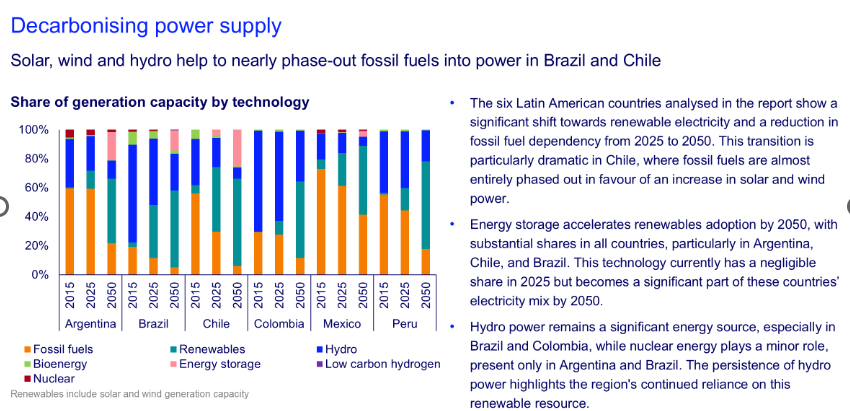
Latin America's Top Economies Raise the Game in Renewable Power
Published by Todd Bush on July 10, 2025
Nearly 70% of electricity comes from renewables, which is about 60% more than the global average
According to the “Benchmarking Latin America energy markets” report from Wood Mackenzie, Latin America is making progress in reducing its carbon emissions and adopting more sustainable energy sources. However, it still has a long way to go to meet global climate goals.
The analysis focuses on the six largest economies in the region by GDP that have more noticeable advances in this field: Brazil, Mexico, Argentina, Colombia, Chile and Peru. Gerado Bocard, research analyst at Wood Mackenzie, said, “These countries share broad structural similarities: reliance on fossil fuels and minerals exports, increasing urbanisation, and growing energy demand.”
>> In Other News: RNG Coalition welcomes One Big Beautiful Act
Fossil fuels: Where there’s room to grow
Fossil fuels remain an important source of energy; however, the selected countries have been working on reducing their dependence on them. Brazil is leading this commitment, and it’s expected to drop its use to 49% by 2050; Mexico remains heavily reliant on fossil fuels with its share declining modestly from 95% to 86% by 2050.
Renewable energy sources bring high expectations
Chile has made significant progress in renewable energy sources, which accounted for 70% of its electricity by the end of 2024; positioning it as a leader in clean energy adoption across Latin America. Some countries, such as Brazil and Colombia, have expanded the use of hydro power, while nuclear energy plays a minor role, present only in Mexico, Argentina and Brazil. Across the region, solar, wind, and biofuels are seeing a significant increase, harnessing rich natural resources.

The promise of green hydrogen and CCUS
Across the region there are 167 low-carbon hydrogen, and 58 carbon capture, utilisation and storage (CCUS) projects announced. Brazil is leading with 43 projects, including 24 Mt CCUS capacity in operation and 11.5 Mt under development. Latin America is experiencing a surge in green hydrogen initiatives at different phases of progress. Currently, 82 projects are actively running, predominantly in Chile, Brazil, and Argentina. Additionally, numerous other projects have been declared and are at various stages of advancement throughout the region.
These developments highlight the diverse approaches taken by different countries in the region. Bocard commented, “We can see how some of these countries obtain benefits from larger domestic markets while others rely on external influences such as import and export for different commodities.” He added, “However, despite the progress, there's still work to be done to have a sustainable and resilient energy future, collaborative efforts, targeted policies and investments will be crucial in achieving net-zero goals.”
Subscribe to the newsletter
Daily decarbonization data and news delivered to your inbox
Follow the money flow of climate, technology, and energy investments to uncover new opportunities and jobs.
Latest issues
-
What Do Submarines Have to Do With Hydrogen?
Inside This Issue 🚢 Hyundai Pitches Hydrogen Transport Tied To Canada Submarine Bid 🧱 The LEGO Group Expands Its Portfolio Of Carbon Removal Solutions 🏆 SAF Pioneer LanzaJet Honored With RFA Indus...
-
This $4.1M Deal Could Change Carbon Capture's Playbook
Inside This Issue 🗜️ CarbonQuest Lands $4.1M Alberta Deal on Gas Compressors 🛡️ CADO, 123Carbon, and Assure SAF Registry Join Forces to Tackle SAF Integrity Gaps ✈️ ISCC, OMV, and Airbus Partner t...
-
Can Koloma Crack Iowa's Billion-Year-Old Secret?
Inside This Issue ⛏️ Iowa's Hydrogen Rush: Can Koloma Strike Gold Before Rules Kick In? ✈️ Bentley Commits to Use 100% Sustainable Aviation Fuel for Car Airfreight 🌬️ Minister Parrott Provides Upd...
Company Announcements
-
CHIFENG, China, Feb. 27, 2026 /PRNewswire/ -- Envision Energy launched the first global shipment of green ammonia from Chifeng, Inner Mongolia to LOTTE Fine Chemical, a premier chemical company in ...
-
SAF Pioneer LanzaJet Honored With RFA Industry Award
Pioneering sustainable aviation fuel producer LanzaJet received the Renewable Fuels Association’s 2026 Industry Award at the National Ethanol Conference in Orlando this week. Last year the company ...
-
Houston Hosts World Hydrogen North America 2026 Industry Gathering
Hydrogen is one of the energy sources that has evolved the most when it comes to how developers plan and execute projects. The main reason for this is the advanced technology that has penetrated th...
-
Trump EPA Eyes Reallocating Waived Biofuel Obligations To Refiners: Report
The question of whether to reallocate those exempted blending obligations to larger refiners is a point of contention between the agriculture and fuel industries The Trump administration has settl...